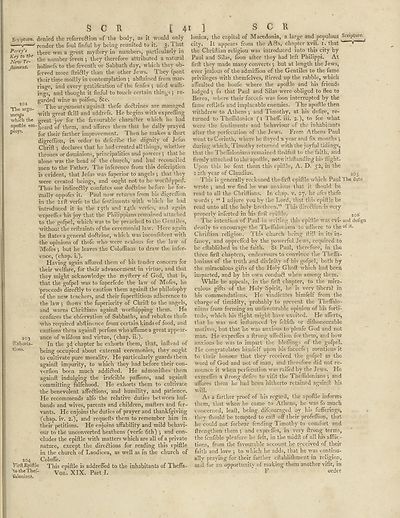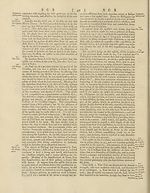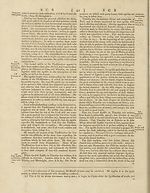Encyclopaedia Britannica, or, a Dictionary of arts, sciences, and miscellaneous literature : enlarged and improved. Illustrated with nearly six hundred engravings > Volume 19, Scripture-SUG
(47) Page 41
Download files
Complete book:
Individual page:
Thumbnail gallery: Grid view | List view

SCR
C 4* ]
SCR
Scripture, denied the refurreftion of the body, as it would only
^ render the foul finful by being reunited to it. 3. That
Percy's tjjere was a great myftery in numbers, particularly in
^Nev^Te- ^ nund361- feven *, they therefore attributed a natural
jlament. holinefs to the feventh or Sabbath day, which they ob-
ferved more ftri&ly than the other Jews. They fpent
their time moftly in contemplation *, abftained from mar¬
riage, and every gratification of the fenfes •, ufed w a fil¬
ings, and thought it finful to touch certain things ; re¬
garded wine as poifon, &c.
The arguments againft tliefe do£lrines are managed
with great fkill and addrefs. He begins with exprefiing
great joy for the favourable character which lie had
-apottle em- }jearj 0f them, and affures them that he daily prayed
102
The argu-
mei^U
which the
ploys.
103
Exhorta¬
tions.
104
FirftEpiftle
to the Thef-
'ialonians.
for their farther improvement. Then he makes a ftiort
digreffion, in order to defcribe the dignity of Jefus
Chrift •, declares that he had created all tilings, whether
thrones or dominions, principalities and powers ; that he
alone was the head of the church, and had reconciled
men to the Father. The inference from this defcription
is evident, that Jefus was fuperior to angels •, that they
were created beings, and ought not to be worfiiipped.
Thus he indireflly confutes one doftrine before he for¬
mally oppofes it. Paul now returns from his digreffion
in the 2ift verfe to the fentiments with which he had
introduced it in the 13th and 14th verfes, and again
expreffes his joy that the Philippians remained attached
to the gofpel, which was to be preached to the Gentiles,
without the reftraints of the ceremonial law. Here again
he ftates a general doftrine, which was inconfiftent with
the opinions of thofe who were z- alous for the law of
Mofes ; but he leaves the Coloffians to draw the infer¬
ence, (chap. i.).
Having again affured them of his tender concern for
their welfare, for their advancement in virtue, and that
they might acknowledge the myftery of God, that is,
that the gofpel was to fuperfede the lawT of Mofes, he
proceeds direflly to caution them againft the philofophy
of the new teachers, and their fuperftitious adherence to
the law ; fhows the fuperiority of Chrift to the angels,
and warns Chriftians againft worffiipping them. He
cenfures the obfervation of Sabbaths, and rebukes thofe
who required abftinence from certain kinds of food, and
cautions them againft perfons who affume a great appear¬
ance of wifdom and virtue, (chap. ii.).
In the 3d chapter he exhorts them, that, inftead of
being occupied about external ceremonies, they ought
to cultivate pure morality. He particularly guards them
againft impurity, to which they had before their con-
verfion been much addi&ed. He admonifties them
againft indulging the irafcible paffions, and againft
committing falfehood. He exhorts them to cultivate
the benevolent affeftions, and humility, and patience.
He recommends alfo the relative duties between huf-
bands and wives, parents and children, mafters and fer-
vants. He enjoins the duties of prayer and thankfgiving
(chap. iv. 2.), and requefts them to remember him in
their petitions. He enjoins affability and mild behavi¬
our to the unconverted heathens (verfe 6th) j and con¬
cludes the epiftle with matters which are all of a private
nature, except the directions for reading this epiftle
in the church of Laodicea, as well as in the church of
Coloffe.
This epiftle is addreffed to the inhabitants of Theffa-
Vol. XIX, Part J.
lonica, the capital of Macedonia, a large and populous Scripture.^
city. It appears from the A£ts, chapter Xvii. 1. that
the Chriftian religion was introduced into this city by
Paul and Silas, foon after they had left Philippi. At
firft they made many converts $ but at length the Jews,
ever jealous of the admiffion of the Gentiles to the fame
privileges with themfelves, ftirred up the rabble, which
affaulted the houfe where the apoftle and his friends
lodged •, fo that Paul and Silas were obliged to flee to
Berea, -where their fuceefs rvas foon interrupted by the
fame reftlefs and implacable enemies. The apoftle then
withdrew to Athens *, and Timothy, at his defire, re¬
turned to Theffalonica (1 Theff. iii. 2.), to fee what
were the fentiments and behaviour of the inhabitants
after the perfecution of the Jews. From Athens Paul
went to Corinth, where he flayed a year and fix months j
during which, Timothy returned with the joyful tidings,
that the Theffalonians remained ftedfaft to the faith, and
firmly attached to the apoftle, notwithftanding his flight.
Upon this he fent them this epiftle, A. D. 52, in the
12th year of Claudius. 205
This is generally reckoned the-firft epiftle which Paul The date
wrote j and we find he was anxious that it fhould be
read to all the Chriftians. In chap. v. 27. he ufes thefe
words ; “ I adjure you by the Lord, that this epiftle be
read unto all the holy brethren.” This direclien is very
properly inferted in his firft epiftle. 206-
The intention of Paul in writing this epiftle was evi- and defign
dently to encourage the Tbeffalonians to adhere to theofh*
Chriftian religion. This church being ftill in its in¬
fancy, and oppreffed by the powerful Jews, required to
be eftablifhed in the faith. St Paul, therefore, in the
three firft chapters, endeavours to convince the Theffa- s
lonians of the truth and divinity of his gofpel, both by
the miraculous gifts of the Holy Ghoft which had been
imparted, and by his own conduft when among them.
While he appeals, in the firft chapter, to the mira¬
culous gifts of the Holy Spirit, lie is very liberal in
his commendations. He vindicates himfelf from the
charge of timidity, probably to prevent the Theffalo¬
nians from forming an unfavourable opinion of his forti¬
tude, which his flight might have excited. He afferts,
that he was not influenced by felfifli or difhonourable
motives, but that lie was anxious to pleafe God and not
man. He exprefies a ftrong affeflion for them, and how
anxious he was to impart the bleffings of the gofpel.
He congratulates himfelf upon his fucccfs ; mentions it
to their honour that they received the gofpel as the
word of God and not of man, and therefore did not re¬
nounce it when perfecution was railed by the Jews. He
expreffes a ftrong defire to vifit the Theffalonians j and
affures them he had been hitherto retained againft his
will.
As a farther proof of his regard, the apofile informs
them, that when he came to Athens, he vras fo much
concerned, leaft, being- difeouraged by his fufferings,
they ftiould be tempted to caft off their profeffion, that
he could not forbear fending Timothy to comfort and
ftrengthen them ; and expreffes, in very ftrong terms,
the fenfible pleafure he felt, in the midft of all his afflic¬
tions, from the favourable account he received of their
faith and love ; to which he adds, that he wras continu¬
ally praying for their farther eftabliftiment in religion,
and for an opportunity of making them another vifit, in
F order
C 4* ]
SCR
Scripture, denied the refurreftion of the body, as it would only
^ render the foul finful by being reunited to it. 3. That
Percy's tjjere was a great myftery in numbers, particularly in
^Nev^Te- ^ nund361- feven *, they therefore attributed a natural
jlament. holinefs to the feventh or Sabbath day, which they ob-
ferved more ftri&ly than the other Jews. They fpent
their time moftly in contemplation *, abftained from mar¬
riage, and every gratification of the fenfes •, ufed w a fil¬
ings, and thought it finful to touch certain things ; re¬
garded wine as poifon, &c.
The arguments againft tliefe do£lrines are managed
with great fkill and addrefs. He begins with exprefiing
great joy for the favourable character which lie had
-apottle em- }jearj 0f them, and affures them that he daily prayed
102
The argu-
mei^U
which the
ploys.
103
Exhorta¬
tions.
104
FirftEpiftle
to the Thef-
'ialonians.
for their farther improvement. Then he makes a ftiort
digreffion, in order to defcribe the dignity of Jefus
Chrift •, declares that he had created all tilings, whether
thrones or dominions, principalities and powers ; that he
alone was the head of the church, and had reconciled
men to the Father. The inference from this defcription
is evident, that Jefus was fuperior to angels •, that they
were created beings, and ought not to be worfiiipped.
Thus he indireflly confutes one doftrine before he for¬
mally oppofes it. Paul now returns from his digreffion
in the 2ift verfe to the fentiments with which he had
introduced it in the 13th and 14th verfes, and again
expreffes his joy that the Philippians remained attached
to the gofpel, which was to be preached to the Gentiles,
without the reftraints of the ceremonial law. Here again
he ftates a general doftrine, which was inconfiftent with
the opinions of thofe who were z- alous for the law of
Mofes ; but he leaves the Coloffians to draw the infer¬
ence, (chap. i.).
Having again affured them of his tender concern for
their welfare, for their advancement in virtue, and that
they might acknowledge the myftery of God, that is,
that the gofpel was to fuperfede the lawT of Mofes, he
proceeds direflly to caution them againft the philofophy
of the new teachers, and their fuperftitious adherence to
the law ; fhows the fuperiority of Chrift to the angels,
and warns Chriftians againft worffiipping them. He
cenfures the obfervation of Sabbaths, and rebukes thofe
who required abftinence from certain kinds of food, and
cautions them againft perfons who affume a great appear¬
ance of wifdom and virtue, (chap. ii.).
In the 3d chapter he exhorts them, that, inftead of
being occupied about external ceremonies, they ought
to cultivate pure morality. He particularly guards them
againft impurity, to which they had before their con-
verfion been much addi&ed. He admonifties them
againft indulging the irafcible paffions, and againft
committing falfehood. He exhorts them to cultivate
the benevolent affeftions, and humility, and patience.
He recommends alfo the relative duties between huf-
bands and wives, parents and children, mafters and fer-
vants. He enjoins the duties of prayer and thankfgiving
(chap. iv. 2.), and requefts them to remember him in
their petitions. He enjoins affability and mild behavi¬
our to the unconverted heathens (verfe 6th) j and con¬
cludes the epiftle with matters which are all of a private
nature, except the directions for reading this epiftle
in the church of Laodicea, as well as in the church of
Coloffe.
This epiftle is addreffed to the inhabitants of Theffa-
Vol. XIX, Part J.
lonica, the capital of Macedonia, a large and populous Scripture.^
city. It appears from the A£ts, chapter Xvii. 1. that
the Chriftian religion was introduced into this city by
Paul and Silas, foon after they had left Philippi. At
firft they made many converts $ but at length the Jews,
ever jealous of the admiffion of the Gentiles to the fame
privileges with themfelves, ftirred up the rabble, which
affaulted the houfe where the apoftle and his friends
lodged •, fo that Paul and Silas were obliged to flee to
Berea, -where their fuceefs rvas foon interrupted by the
fame reftlefs and implacable enemies. The apoftle then
withdrew to Athens *, and Timothy, at his defire, re¬
turned to Theffalonica (1 Theff. iii. 2.), to fee what
were the fentiments and behaviour of the inhabitants
after the perfecution of the Jews. From Athens Paul
went to Corinth, where he flayed a year and fix months j
during which, Timothy returned with the joyful tidings,
that the Theffalonians remained ftedfaft to the faith, and
firmly attached to the apoftle, notwithftanding his flight.
Upon this he fent them this epiftle, A. D. 52, in the
12th year of Claudius. 205
This is generally reckoned the-firft epiftle which Paul The date
wrote j and we find he was anxious that it fhould be
read to all the Chriftians. In chap. v. 27. he ufes thefe
words ; “ I adjure you by the Lord, that this epiftle be
read unto all the holy brethren.” This direclien is very
properly inferted in his firft epiftle. 206-
The intention of Paul in writing this epiftle was evi- and defign
dently to encourage the Tbeffalonians to adhere to theofh*
Chriftian religion. This church being ftill in its in¬
fancy, and oppreffed by the powerful Jews, required to
be eftablifhed in the faith. St Paul, therefore, in the
three firft chapters, endeavours to convince the Theffa- s
lonians of the truth and divinity of his gofpel, both by
the miraculous gifts of the Holy Ghoft which had been
imparted, and by his own conduft when among them.
While he appeals, in the firft chapter, to the mira¬
culous gifts of the Holy Spirit, lie is very liberal in
his commendations. He vindicates himfelf from the
charge of timidity, probably to prevent the Theffalo¬
nians from forming an unfavourable opinion of his forti¬
tude, which his flight might have excited. He afferts,
that he was not influenced by felfifli or difhonourable
motives, but that lie was anxious to pleafe God and not
man. He exprefies a ftrong affeflion for them, and how
anxious he was to impart the bleffings of the gofpel.
He congratulates himfelf upon his fucccfs ; mentions it
to their honour that they received the gofpel as the
word of God and not of man, and therefore did not re¬
nounce it when perfecution was railed by the Jews. He
expreffes a ftrong defire to vifit the Theffalonians j and
affures them he had been hitherto retained againft his
will.
As a farther proof of his regard, the apofile informs
them, that when he came to Athens, he vras fo much
concerned, leaft, being- difeouraged by his fufferings,
they ftiould be tempted to caft off their profeffion, that
he could not forbear fending Timothy to comfort and
ftrengthen them ; and expreffes, in very ftrong terms,
the fenfible pleafure he felt, in the midft of all his afflic¬
tions, from the favourable account he received of their
faith and love ; to which he adds, that he wras continu¬
ally praying for their farther eftabliftiment in religion,
and for an opportunity of making them another vifit, in
F order
Set display mode to:
![]() Universal Viewer |
Universal Viewer | ![]() Mirador |
Large image | Transcription
Mirador |
Large image | Transcription
Images and transcriptions on this page, including medium image downloads, may be used under the Creative Commons Attribution 4.0 International Licence unless otherwise stated. ![]()
| Permanent URL | https://digital.nls.uk/192695893 |
|---|
| Attribution and copyright: |
|
|---|
| Description | Ten editions of 'Encyclopaedia Britannica', issued from 1768-1903, in 231 volumes. Originally issued in 100 weekly parts (3 volumes) between 1768 and 1771 by publishers: Colin Macfarquhar and Andrew Bell (Edinburgh); editor: William Smellie: engraver: Andrew Bell. Expanded editions in the 19th century featured more volumes and contributions from leading experts in their fields. Managed and published in Edinburgh up to the 9th edition (25 volumes, from 1875-1889); the 10th edition (1902-1903) re-issued the 9th edition, with 11 supplementary volumes. |
|---|---|
| Additional NLS resources: |
|

